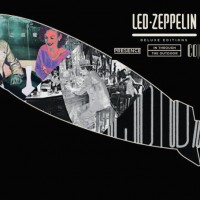Led Zeppelin wasn’t always this thundering, then nimble, amalgamation.
The band’s first album had, on its surface, only a copycat kind of appeal. Recorded over just 30 hours, these songs were presented in the same way Zeppelin would have done them on stage at the time — half rendition, half sweaty tribute. They were, as much as anything, another British referendum on the brilliance of American blues music.
It wasn’t, however, all that interesting.
Parts of Zeppelin’s second album approached their more celebrated late-period brilliance — namely “Whole Lotta Love,” (the much better) “What Is and What Should Never Be” and “Ramble On,” which was lyrically linked to J.R.R. Tolkien’s Lord Of The Rings.
But how’s this for un-revolutionary?: Led Zep was successfully sued for stealing Chicago blues legend Howlin’ Wolf’s “Killing Floor,” without giving any credit, on an “original” called “The Lemon Song” from the second CD. Further, “Bring It On Home” is just Sonny Boy Williamson, though perfectly amped up.
They moved past it. And there’s little doubt that Led Zep found its true inspiration when the band stopped aping the early U.S. traditionalists which it so rightly admired — the bulk of which appears from 1970 on.
 By “III,” the Zeps had shed their then-growing reputation as blues cheats by presenting a sweetly cool-rocking set of mostly acoustic-based tunes — coupled with one of their best album-openers ever, “Immigrant Song.” From there on out, as the band rounded into its best creative period, Zeppelin displayed a newfound versatility and a refreshing willingness to dabble in various musical forms.
By “III,” the Zeps had shed their then-growing reputation as blues cheats by presenting a sweetly cool-rocking set of mostly acoustic-based tunes — coupled with one of their best album-openers ever, “Immigrant Song.” From there on out, as the band rounded into its best creative period, Zeppelin displayed a newfound versatility and a refreshing willingness to dabble in various musical forms.
They weren’t sounding anything like the blues musicians they’d once blatantly emulated. No, by then, Led Zep was a completely new synthesis.
What to make, then, of “Presence” — Led Zeppelin’s underrated seventh release? After all, this unpolished gem from that second period is actually best described as a moment when the band stopped for a longing look back. They never sounded bluesier during a late ’70s period defined by debauchery — when, as Rolling Stone’s Stephen Davis famously wrote in his review of this album, you could “give an Englishman 50,000 watts, a chartered jet, a little cocaine and some groupies and he thinks he’s a god.”
Davis is talking about singer Robert Plant, of course. But this album belongs to Plant’s doomed drummer John Bonham, and that gives it a slow-rolling menace very familiar to fans of the band’s earliest work.
By 1976, Zeppelin had begun its slow descent, and Plant was recovering from a serious auto accident. Perhaps predictably, they were introspective. But even in what should have been safe nostalgia, Bonham unleashes newfound, and surprisingly subtle, polyrhythms. He now has the ability to quietly improvise on the heaviest of those heavy Led moans — including “blooze” throwbacks like “For Your Life” and “Tea for One.”
A favorite is “Achilles Last Stand”: Bonham, and this is special, works as the lead instrument over roughly the first half of this song. Even Jimmy Page’s patented “army of guitars” sound is no match for Bonham’s charging fills.
He begins by powering an absolutely monstrous template, then delves into jazzy asides — deftly coloring the beat. “Achilles” takes an abrupt turn and we ride with Bonham up to Page’s thundering solo like the clack-clack-clack of a roller coaster … you know, you feel, that something big is going to happen.
Does it ever. They circle back around to the tune’s original chugging, marrow-deep groove. I was zipping along at 45 in a 30 before I knew it, this morning, thinking: I sure miss this guy.
There is, inside of this late-career gift, much to love — not least of which is one of the most wicked harmonica solos in all of rock, on “Nobody’s Fault But Mine.”
“Presence” was a memorable outburst of creativity from a band about to implode, an album that once again lovingly incorporated their earliest, and most powerful, influences. It was, in the band’s penultimate moments, a true triumph.
Of course, the center of this thing, the hard-charging Bonham, could not hold. He was as committed to drink, it seemed, as he was to the drum.
But before Zeppelin fell to pieces, they got together to make “Presence.”
- Nick DeRiso’s Best of 2015 (Rock + Pop): Death Cab for Cutie, Joe Jackson, Toto + Others - January 18, 2016
- Nick DeRiso’s Best of 2015 (Blues, Jazz + R&B): Boz Scaggs, Gavin Harrison, Alabama Shakes - January 10, 2016
- Nick DeRiso’s Best of 2015 (Reissues + Live): John Oates, Led Zeppelin, Yes, Faces + others - January 7, 2016





Yep – you nailed it – in many spots as good a piece of work as you would hear from one of the mightiest rock groups ever. And mostly under the radar nowadays.
Zeppelin was on a roll with Zep IV, Houses Of The Holy, Physical Graffiti and Presence.
If you look at the whole history of rock albums it seems like everyone is always talking about the same damn albums like Pet Sounds, Darkside Of The Moon, all The Beatle albums and so on. All those records had their moments but I think so many like those are always too over rated, giving too much credit for just so so songs….. This is one most people don’t really mention when it comes to Zeppelin. It isn’t the debut, or filled with stolen bits of songs or all acoustic or too experimental so maybe that is what makes it worth listening to. It won’t be one you hear too often and it rocks when it needs to. I think too many people are always looking for reasons why albums suck instead of just putting the disc on and enjoying it for what it is.